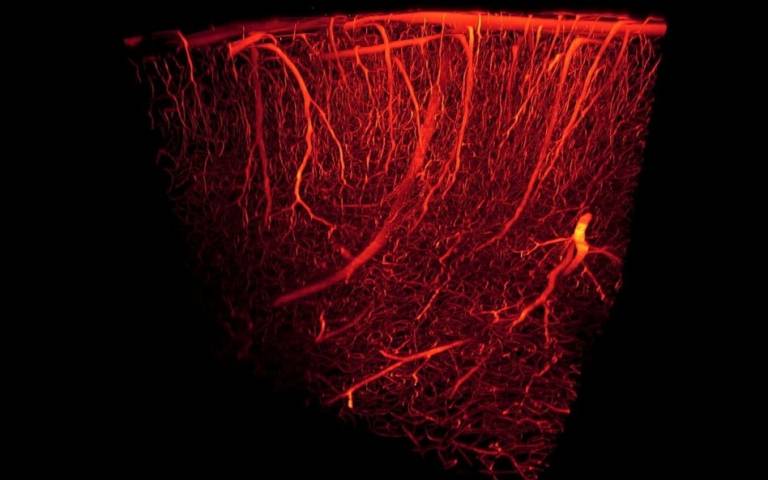Squeezing of blood vessels may contribute to cognitive decline in Alzheimer’s
27 June 2019
Reduced blood flow to the brain associated with early Alzheimer’s may be caused by the contraction of cells wrapped around blood vessels, according to a UCL-led study that opens up a new way to potentially treat the disease.

Blood provides the brain’s energy supply in the form of glucose and oxygen. Earlier studies have suggested the first change in Alzheimer’s disease is a decrease in cerebral blood flow.
The study, published in the journal Science and funded by the European Research Council, Wellcome and the Wolfson Foundation, looked at the role of pericytes, cells wrapped around capillaries that have the ability to contract and regulate blood flow.
Researchers examined capillaries in Alzheimer’s-affected human brain tissue and in mice bred to develop Alzheimer’s pathology, and found that they were squeezed by pericytes. They also applied amyloid beta protein (which accumulates in the brains of people with Alzheimer’s) to slices of healthy brain tissue, and found that the capillaries were squeezed as a result.
They calculated that the constriction was severe enough to halve blood flow, which is comparable to the decrease in blood flow found in parts of the brain affected by Alzheimer’s.
Lead author Dr Ross Nortley (UCL Neuroscience, Physiology & Pharmacology and UCL Queen Square Institute of Neurology) said: “Our study has, for the first time, identified the underlying mechanism behind the reduction of brain blood flow in Alzheimer’s disease. Since reduced blood flow is the first clinically detectable sign of Alzheimer’s, our research generates new leads for possible treatments in the early phase of the disease.”
Professor David Attwell (UCL Neuroscience, Physiology & Pharmacology), senior author of the study, said: “Damage to synapses and neurons in Alzheimer’s is usually attributed to the actions of amyloid and tau proteins accumulating in the brain. Our research raises the question of what fraction of the damage is a consequence of the decrease in energy supply that amyloid produces by constricting the brain’s finer blood vessels. In clinical trials, drugs that clear amyloid beta from the brain have not succeeded in slowing mental decline at a relatively late phase of the disease. We now have a new avenue for therapies intervening at an earlier stage.”
The finding raises the prospect of treatments for Alzheimer’s that are focused on keeping the pericytes relaxed.
Links
- Nortley et al. Amyloid β oligomers constrict human capillaries in Alzheimer’s disease via signaling to pericytes. Science 20 Jun 2019: 10.1126/science.aav9518
- Professor David Attwell’s academic profile
- Dr Ross Nortley’s ResearchGate page
- UCL Neuroscience, Physiology & Pharmacology
- European Research Council
- Wellcome
- Wolfson Foundation
Image
3D rendering of a one-cubic millimetre portion of mouse brain cortex, with blood vessels stained. Source: Wikimedia Commons. Credit: Antonino Paolo Di Giovanna
 Close
Close

